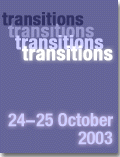
|
 |
Papers from the Colloquium
Theme 3: Gaps and transitions: thinking in Mathematics
Dr Elena Nardi, University of East Anglia
This response to Margaret Brown’s contribution aims at introducing
the views of a group of mathematicians as expressed in a study
on the teaching and learning of mathematics at university level,
currently in progress at the University of East Anglia and funded
by the Learning and Teaching Support Network. The findings reported
here can be seen in greater detail in Nardi, E., Iannone, P. & Cooker,
M.J. (2003, in press) ‘Pre-eighteen students have lost something
major’: Mathematicians on the impact of school mathematics
on students’ skills, perceptions and attitudes, Proceedings
of the Day Conference of the British Society for Research Into
the Learning of Mathematics, Birmingham University, 13 November
2003.
For the aims, methodology and other publications from the study,
please contact Elena Nardi or browse at http://www.uea.ac.uk/~m011
According to the participants in this study, students arrive at
university with a perception of mathematical thinking as primarily
involving calculation, not reasoning. Their school mathematical
experiences are seen as responsible for this image of the field:
a brief scrutiny of school textbooks shows up an instrumental approach.
Students may complete schooling without having seen a proof, even
of Pythagoras’ Theorem, a mathematical fact for which there
exist almost language and logic free proofs and which, in the vernacular,
is mostly associated with the word ‘theorem’ –
perhaps, recently, along with Fermat’s Last Theorem. But,
even when exposed to a proof of Pythagoras’ Theorem or of
the irrationality of Ö2 – the latter is often the only
proof seen at school – students, dwelling on mathematical
thinking as primarily involving calculation, often perceive this
exposure as a demonstration of a rule, rather than a proof. To
them
‘proof’ is still a rather vague term. Clarifying this
vague image is not helped by the fact that the students can be
exposed to proof on rare occasions, even just once.
The demise of Geometry in school mathematics is another factor
that has hindered the presence of mathematical reasoning and proof
as, when Geometry is removed, the number of accessible, doable
proofs that remains is severely cut. With some Co-ordinate Geometry
and plenty of Trigonometry still in the syllabus, only an implicit
experience of proving is still available. In fact this experience
is mainly associated with algebraic manipulation and therefore
it potentially reinforces the above image of mathematics as mostly
involving calculation. The reasoning, as well as the linguistic
structures underlying mathematical reasoning - and who would doubt
the benefit embedded in exchanging mathematical ideas in grammatically
sound, full sentences for a student’s overall enhanced power
of persuasion in speaking and writing? - are too implicit in the
algebraic expressions used in this type of manipulative proof (for
example, starting from one side of an equality and ending up on
the other).
A simple proving technique, such as Proof by Mathematical Induction,
can be used as a demonstration of how fascinating mathematical
thinking can be. It is a great loss to students – and with
repercussions for the level of mathematics taught in universities
and in teacher education – that, along with other forms of
reasoning, consistent student failure at this type of exam question
has led to its gradual removal from school mathematics (with further
selective omissions from an already depleted syllabus when aiming
at groups of students with varying perceived abilities, e.g. C/D
or B/C at GCSE level).
A utilitarian approach to school mathematics, namely one that
has undermined an image of mathematics as an intellectually attractive
activity and one that has ignored the views of mathematical scholars,
has produced a dry, unappealing school subject. Convincing young
people about the attractiveness of an activity that has sometimes
a slower turnover in terms of intellectual and emotional gratification
is nowadays, in a culture that favours instant gratification, a
difficult task. The surrender to a utilitarian image of mathematics
has been a destructive move as, by promoting an image of university
studies as a mere opportunity for a better salary, it has led to
perilously small numbers of students taking up studies in mathematics,
engineering, physics and chemistry. Improved social recognition,
as well as better earnings, are vital if we are to address the
now urgent need to attract better mathematics graduates to the
profession.
|
 |


|


![]() +44 (0)20 7679 2000 - Copyright © 1999-2006
UCL
+44 (0)20 7679 2000 - Copyright © 1999-2006
UCL